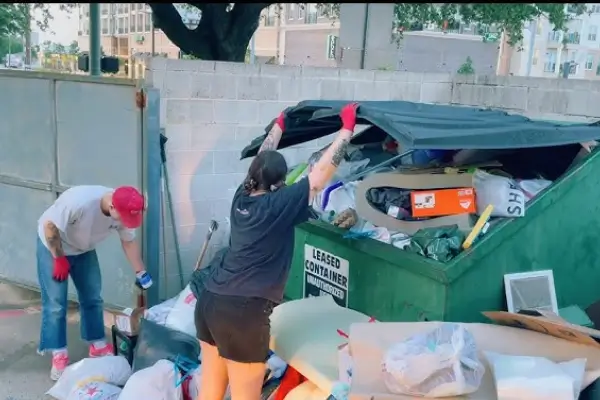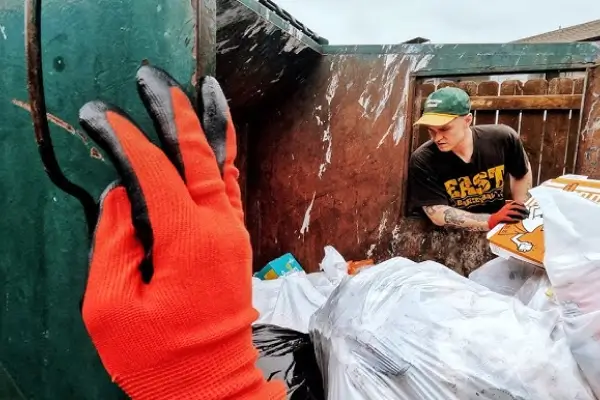Is Dumpster Diving Illegal? What You Need to Know

Dumpster diving, or collecting discarded items from business or residential garbage bins, has gotten many people’s attention. People dive into dumpsters for a variety of reasons, including financial necessity, environmental concerns, and the desire to find items that may be reused or recycled. However, one urgent concern remains: Is dumpster diving illegal? This article delves into the legal, ethical, and practical issues of dumpster diving, providing a complete guide for people wondering about the subject.
What is Dumpster Diving?
Dumpster diving is rescuing products from waste dumpsters, often found behind businesses, homes, or public spaces. Food, furniture, electronics, and clothing are usually recovered items. While some see it as a method to decrease waste and save money, others believe it is a contentious practice.
Is Dumpster Diving Illegal? The Legal Perspective
Dumpster diving is legal under certain circumstances, including geography, property ownership, and local law. Here’s what you should know.
Trespassing Laws
In many jurisdictions, the primary legal concern near dumpster diving is trespassing. Dumpsters are commonly found on private land, such as behind storefronts or in residential buildings. Entering these sites without permission can result in trespassing charges, even if the dumpster is accessible.
Ownership of Discarded Items
In the United States, when an item is dumped, it is considered abandoned and no longer belongs to the original owner. However, this does not provide unrestricted access. Local regulations and property owners may still impose restrictions.
City and State Regulations
Some towns and jurisdictions have laws restricting dumpster diving to ensure public safety and hygiene. Digging through domestic trash bins may also be banned in some municipalities.
Health and Safety Concerns
In some regions, health rules may ban the retrieval of discarded food or commodities from dumpsters, particularly those near restaurants or grocery stores. Violations of these rules might result in fines.

Ethical Considerations of Dumpster Diving
Aside from legality, dumpster diving involves various ethical considerations.
Impact on Businesses
Businesses may see dumpster diving as a liability issue. Divers may harm themselves or interrupt operations, negatively affecting the firm.
Redistribution of Resources
While dumpster diving can help minimize waste, it may also deprive others, such as people experiencing homelessness or those in need, of goods left for them on purpose.
Environmental Benefits
Plus, dumpster diving decreases garbage transported to landfills while encouraging recycling and repurposing. Many divers claim that they contribute to environmental sustainability.
Practical Tips for Dumpster Diving
If you’re thinking about dumpster diving, here are some practical suggestions to keep yourself safe and within the law:
- Research Local Laws: Before diving, check city ordinances and property rules.
- Seek Permission: When possible, ask property owners or managers for permission.
- Dive During Safe Hours: Avoid searching through dumpsters late at night to avoid suspicion.
- Wear Protective Gear: Gloves and sturdy shoes help avoid sharp items and unhygienic environments.
- Stay Visible: For protection, keep a flashlight accessible and make yourself visible to others.
Familiar Places for Dumpster Diving
If you’re searching for the best places to dumpster dive, consider:
- Grocery Stores: Food nearing the end of its shelf life but still edible is often discarded.
- Retail Stores: Returnable or damaged items are sometimes discarded.
- College Campuses: Students frequently dispose of furniture and devices during their moves.
- Construction Sites: It is expected to save leftover building materials.
Outcome of Illegal Dumpster Diving
Engaging in illegal dumpster diving might have terrible results.
- Fines and Penalties: Violators may face monetary fines under local laws.
- Criminal Charges: Trespassing or stealing might result in charges being filed.
- Property Damage Claims: If a diver damages a dumpster or property, they may be held responsible.
Alternatives to Dumpster Diving
For people concerned about legal or ethical issues, consider these alternatives:
- Buy Nothing Groups: Local communities often organize groups to share free items.
- Thrift Stores: Second-hand stores provide affordable clothing, furniture, and more options.
- Food Banks: Access free or low-cost food through community organizations.

FAQs About Dumpster Diving
Is dumpster diving illegal everywhere?
No, legality is determined by local laws, property ownership, and individual circumstances. Researching local regulations is crucial.
Is dumpster diving illegal in Ohio?
Yes, it is Legal to Dumpster Dive in Ohio. In some cases, it varies by municipality, as local laws and property rights may impose restrictions. It is important to check specific city ordinances before engaging in the practice.
Is dumpster diving illegal in NC?
Yes, dumpster diving is illegal and dishonorable in North Carolina.
Is dumpster diving illegal in Texas and PA?
Dumpster diving is generally legal in all 52 U.S. states, including Texas, and Pennsylvania. But before diving in, be familiarize yourself with dumpster diving laws in Texas, as legality often depends on local ordinances and property trespassing rules.
Is dumpster diving legal in California and florida?
Dumpster diving is allowed under Florida and California law. However, it is forbidden on private property without authorization, especially if it entails trespassing or causing disturbance.
Can I be arrested for dumpster diving?
Yes, if found trespassing or breaking local laws, you may face arrest or legal action.
How can I avoid legal trouble while dumpster diving?
Yes, you may face arrest or legal action if you are found trespassing or breaking local laws.
When is the best time to dumpster dive?
The best time to dumpster dive is usually late at night or early in the morning when businesses have closed and trash has been freshly discarded.

Conclusion
Dumpster diving is a controversial practice that combines legal, ethical, and environmental concerns. While it can provide valuable resources and decrease waste, following local regulations and protecting property rights is crucial. Staying informed can help you manage the complexity of dumpster diving and make informed judgments regarding this activity.




